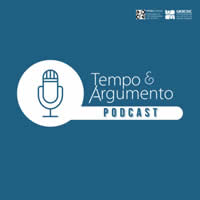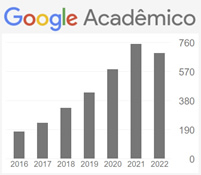Imprisoned writings: (im)possible sources for the History of the Present Time
DOI:
https://doi.org/10.5965/2175180316432024e0111Keywords:
public history, participatory research, body, orality, LabhoiAbstract
This article presents reflections on the intersection of public history, participatory research, oral history, and corporeality, drawing on the theoretical and methodological approaches of the Oral History and Image Laboratory at Fluminense Federal University (LABHOI/UFF, founded in 1982). It aims to examine oral history collections created through participatory research practices that incorporate embodied forms of public narrative – the recognition of pasts manifested in bodies through socially engaged work. The article explores research processes that fully acknowledge the role of the body in shaping historical subjects.
Downloads
References
ABARRÓN, Luis Rodrigues; LANDA, Libertad Hernández. Investigación Participativa. Madrid: Centro de Investigaciones Sociológicas, 1994. (Cadernos Metodológicos 10
ABREU, Martha; GURAN, Milton; MATTOS, Hebe. Por uma história pública dos africanos escravizados. Estudos Históricos, Rio de Janeiro, v. 27, n. 54, p. 248, jul./dez. 2014.
ALMEIDA, Juniele Rabêlo de; AMORIM, Maria Aparecida; BARBOSA, Xênia. Performance e objeto biográfico: questões para a história oral de vida. Oralidades, São Paulo, n. 2, p. 101-109, 2007.
ALMEIDA, Juniele Rabêlo de; ANDRADE, Everardo Paiva (orgs.). História oral e educação. São Paulo: Letra e Voz, 2019. (Coleção história oral e dimensões do público).
ALMEIDA, Juniele Rabêlo de; ROSA, Rogério (org.). História pública em movimento. São Paulo: Letra e Voz, 2021.
ALMEIDA, Juniele Rabêlo de; ROVAI, Marta Gouveia de Oliveira (org.). Introdução à história pública. São Paulo: Letra e Voz, 2011.
AMATO, Gabriel; HERMETO, Miriam. Entre a História, as estórias e os gestos: performance narrativa em entrevistas de história oral. In: ROVAI, Marta Gouveia de Oliveira; SANTHIAGO, Ricardo (org.). História oral como experiência: reflexões metodológicas a partir de práticas de pesquisa. Teresina: Cancioneiro, 2021. p. 165-194.
BACZKO, Bronislaw. Imaginação social. In: ENCICLOPÉDIA EINAUDI. Lisboa: Imprensa Nacional: Casa da Moeda: Editora Portuguesa, 1985. p. 296-332.
BARROS, Regina Benevides de. Grupo: a afirmação de um simulacro. Porto Alegre: Sulina: Editora UFRGS, 2007.
BAUMAN, Richard. Story, performance, and event: contextual studies of oral narrative. Cambridge: University Press, 1986.
BRANDÃO, Carlos Rodrigues. Pesquisa participante. São Paulo: Brasiliense, 1984.
CHASSOT, Caroline; SILVA, Rosane. A pesquisa-intervenção participativa como estratégia metodológica: relato de uma pesquisa em associação. Psicologia Social, Recife, v. 30, p. 73-87, 2018.
CONNERTON, Paul. Como as sociedades recordam. Oeiras: Ed. Celta, 1999.
FALS BORDA, Orlando. Participatory (action) research in social theory: origins and challenges. In: WHYTE, William Foote (ed.). Participatory action research. Newbury Park: SAGE, 1991. p. 119-126.
FOUCAULT, Michel. Vigiar e punir: nascimento da prisão. 36. ed. Petrópolis: Vozes, 1975.
HOBSBAWM, Eric. Engajamento. In: HOBSBAWM, Eric. Sobre história: ensaios. São Paulo: Companhia das Letras, 2006. p. 138-154.
MAUAD, Ana Maria Mauad; ALMEIDA, Juniele Rabêlo de; SINDER, Matheus Sinder; OLIVEIRA, Marcus. O arquivo de história oral e as linhas de pesquisa do LABHOI-UFF: Laboratório de História Oral e Imagem da Universidade Federal Fluminense. In: HEYMANN, Luciana. História oral e arquivo: debates e desafios. São Paulo: Letra e Voz, 2024. p. 160-172
MAUAD, Ana Maria. Usos do passado e história pública no Brasil: a trajetória do Laboratório de História Oral e Imagem da Universidade Federal Fluminense (1982-2017). História Crítica, Bogotá, n. 68, p. 27-45, 2018.
MAUAD, Ana Maria; ALMEIDA, Juniele Rabêlo de; SANTHIAGO, Ricardo (orgs.). História pública no Brasil: sentidos e itinerários. Ed: Letra e Voz, 2016.
MAUAD, Ana Maria; DUMAS, Fernando. Fontes orais e visuais na pesquisa histórica: novos métodos e possibilidades narrativas. In: ALMEIDA, Juniele Rabêlo de; ROVAI, Marta Gouveia de Oliveira (org.). Introdução à história pública. São Paulo: Letra e Voz, 2011. p. 81-95.
MAUAD, Ana Maria; KNAUSS, Paulo. Memória em movimento: a experiência videográfica do LABHOI/UFF. História Oral, Rio de Janeiro, v. 9, n. 1, p. 143-58, 2006.
PAULON, Simone. A análise de implicação como ferramenta na pesquisa-intervenção. Psicologia & Sociedade, Recife, v. 17, n. 3, p. 16-23, 2005.
PORTELLI, Alessandro. Tentando aprender um pouquinho: algumas reflexões sobre a ética na história oral. Projeto História, São Paulo, n. 15, p. 13, 49, abr. 1997.
POZZI, Pablo. La ética, la historia oral y sus consecuencias. História Oral, Rio de Janeiro, v. 17, n. 2, p. 9-29, jul./dez. 2014.
SANTHIAGO, Ricardo. Levantando a quarta parede: história oral e entrevistas públicas. Estudos Ibero-Americanos, Porto Alegre, v. 47, n. 2, p. 1-17, maio/ago. 2021.
TAYLOR, Diana. The archive and the repertoire: performing cultural memory in the Americas. Durham: Duke University Press, 2003.
TORRES, Maria José Azevedo. Pesquisa participativa: uma introdução aos seus princípios e práticas. São Paulo: Cortez, 2008.
ZUMTHOR, Paul. Performance, recepção, leitura. São Paulo: Cosac Naify, 2018.
Downloads
Published
How to Cite
Issue
Section
License
Copyright (c) 2024 Tempo e Argumento

This work is licensed under a Creative Commons Attribution-NonCommercial 4.0 International License.
The articles published by the magazine are for free use, destined for educational purposes and not commercial. The copyrights are all granted to the magazine. The articles whose authors are identified represent the expressed opinion of its authors and not the official position of the Tempo e Argumento magazine or of the Postgraduate Program in History of the Universidade do Estado de Santa Catarina.




